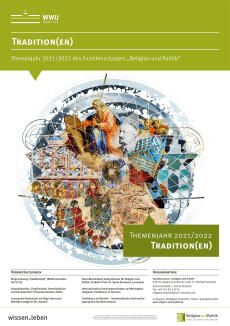Traditions: invented, kept secret, reinterpreted
Second annual theme of the Cluster of Excellence to examine how societies and religions deal with traditions – How do traditions come into being, how are they passed on, changed, and used in the interests of power? – Case studies from Ancient Egypt to the transmission of religions in families today – Annual theme begins with public lecture series

Debates about equality, identity or religion often portray traditions as static, but on closer examination we find that they are subject to constant change. “Depending on the interests of the group that bears them, traditions have been and still are being changed, reinterpreted, reshaped, kept secret, veiled or even invented”, explain Jewish scholar Regina Grundmann and Catholic theologian Michael Seewald at the start of the second annual theme, “Tradition(s)”, at the University of Münster’s Cluster of Excellence “Religion and Politics”. The 2021/22 annual programme will see Cluster members and guests from the academic world and art use case studies ranging from antiquity to the present day to discuss the emergence, transmission and transformation of traditions in, for example, literature, law and religion. Arabic scholar Sarah Stroumsa from the Hebrew University in Jerusalem will attend as Hans Blumenberg guest professor.
“Arguments about tradition play an especially important role in religions”, explain Grundmann and Seewald. “Judaism, Christianity and Islam refer to revelations. They assume that, at a certain point in time, God communicated something significant for all times that must be passed on”. Groups of people such as priests, scribes and legal scholars who record, canonize and interpret traditions therefore play an important role in religions of revelation. “Religions that are not based on revelation also engage in tradition-building – in the form of rituals, narratives or ministries that are passed down through generations”. The annual theme begins on 2 November with the lecture series “Tradition(s)”. The thematic spectrum ranges from the ancient Egyptian god Amun to tradition and innovation in Arabic literature, and to the transmission of religious traditions in families today
Innovation through tradition?
Grundmann and Seewald have repeatedly discovered the paradox in the history of religion that religions develop their potential for innovation precisely through drawing on what is supposedly enduring: namely, traditions. “Some religious communities, such as the Catholic Church, have a problem with explicit innovation”, says Michael Seewald. “The history of dogma is familiar with many examples of veiling innovation. The Catholic magisterium has in fact often adopted new positions – in the 20th century, for example, the recognition of religious freedom and freedom of conscience at the Second Vatican Council. But, by resorting to supposed traditions, it conceals the fact that a change of position has taken place”. Regina Grundmann: “We see an interplay of tradition and criticism of tradition in the monotheistic religions, and not only in the modern era”. Even under the conditions of late antique and medieval cultures, “processes of displacement, reinterpretation and criticism” were possible in religious traditions. “In quite a few cases, they even seem to have been an indispensable prerequisite for religious traditions to continue their existence and to be seen as ‘tradition’”.
At least three perspectives can be distinguished in the study of tradition(s): “The process of transmission or the act of handing down (‘tradition’); the content or practices of what is handed down (‘traditions’); and the actors or the groups carrying the tradition (‘tradents’ and recipients, as well as their relationship with one another)”. The annual theme “Tradition(s)” will examine these three perspectives across different epochs and from the viewpoint of different disciplines in the humanities, law, and social sciences. The Cluster of Excellence’s first annual theme took place in 2020/21 and was entitled “Belonging and Demarcation: Dynamics of Social Formation”. (sca/vvm)

